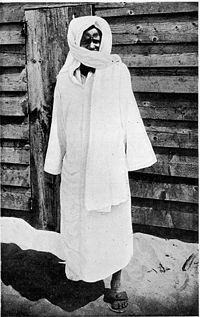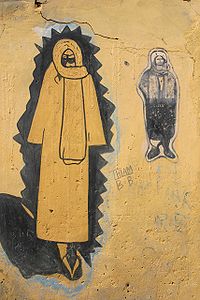- Amadou Bamba
-
Ahmadou Bamba, Cheikh Ahmadou Bamba Mbacké (1853-1927) (Aamadu Bamba Mbàkke in Wolof, Shaykh Aḥmad ibn Muḥammad ibn Ḥabīb Allāh (Arabic: أحمد بن محمد بن حبيب الله) also known as Khadīmu 'l-Rasūl (Arabic: خادِم الرسول) or "The Servant of the messenger", and as Sëriñ Tuubaa or "Cheikh of Tuubaa" in Wolof), was a Muslim Sufi religious leader in Senegal and the founder of the large Mouride Brotherhood (the Muridiyya).
Cheikh Ahmadou Bamba was a mystic and religious leader who produced a prodigious quantity of poems and tracts on meditation, rituals, work, and Qur'anic study. Politically, Ahmadou Bamba led a pacifist struggle against French colonialism while not waging outright war on the French as several prominent Tijani marabouts had done.
Contents
Biography
Shaykh Aḥmadu Bàmba Mbàkke was born in the village of Mbacké (Mbàkke Bawol in Wolof) in the Kingdom of Baol, the son of a marabout from the Xaadir (Qadriyya) brotherhood, the oldest in Senegal.
A religious prayer leader, poet and monk, Ahmadou Bamba founded the Mouride brotherhood in 1883 and the city of Touba. In one of his numerous writings, Matlabul Fawzeyni (the quest for happiness in both worlds), Sheikh Ahmadou Bamba describes the purpose of the city which he founded in 1887. In his concept, Touba should reconcile the spiritual and the temporal. Sheikh Ahmadou Bamba intended to have the spiritual capital of his brotherhood showing all the characteristics of a Muslim city.
Facing colonial rule
As his fame spread, the French colonial government worried about Bamba's growing power and potential to wage war against them. He had converted a number of traditional kings and their followers and no doubt could have raised a huge military force, as Muslim leaders like Umar Tall and Samory Touré had before him.
The French sentenced him to exile in Gabon (1895–1902) and later in Mauritania (1903–1907). However, these exiles fired stories and folk tales of Bamba's miraculous survival of torture, deprivation, and attempted executions, and thousands more flocked to his organization. On the ship to Gabon, forbidden from praying, Bamba is said[weasel words] to have broken his leg-irons, leapt overboard into the ocean and prayed on a prayer rug that appeared on the surface of the water, so devout was he. Or, when the French put him in a furnace, he simply sat down in it and drank tea with Muhammad. In a den of hungry lions, the lions slept beside him, etc.
By 1910, the French realized that Bamba was not interested in waging war against them, and was in fact quite cooperative, eventually releasing him to return to his expanded community. In 1918, he won the French Legion of Honor for enlisting his followers in the First World War and the French allowed him to establish his community in Touba, believing in part that his doctrine of hard work could be made to serve French economic interests. His movement was allowed to grow, and in 1926 he began work for the great mosque at Touba where he is buried. After his death in 1927, he has been succeeded by his descendants as hereditary leaders of the brotherhood with absolute authority over the followers.
Importance to Islam and anticolonialism
As the founder of Mouridism, Cheikh Ahmadou Bamba is considered one of the greatest spiritual leaders in Senegalese history. Mouridism is today one of Senegal’s four Sufi movements, with four million devotees in Senegal alone and thousands more abroad majority of who are emigrants from Senegal. Followers of the Mouridism movement, an offshoot of traditional Sufi philosophy, aspire to live closer to God, in emulation of the Prophet Muhammad's example.
Amadou Bamba's teachings emphasized the virtues of pacifism and the importance of hard work, became in the 20th century one of the biggest influences on contemporary Senegalese life and culture.
As an ascetic marabout who wrote tracts on meditation, rituals, work, and Qur'anic study, he is perhaps best known for his emphasis on work, and his disciples are known for their industriousness.
In the political sphere, Ahmadou Bamba led a pacifist struggle against French colonialism while trying to restore a purer practice of Islam insulated from French colonial influence. In a period when successful armed resistance was impossible, Cheikh Ahmadou Bamba led a spiritual struggle against colonial culture and politics. Although he did not wage outright war on them as several prominent Tijaan marabouts had done, he taught what he called the jihād al-'akbar or "greater struggle," which fought not through weapons but through learning and fear of God.
Respected by Mourides
Bamba's followers call him a "renewer" (mujaddid in Arabic) of Islam, citing a hadith that implies that God will send renewers of the faith every 100 years (the members of all the Senegalese brotherhoods claim that their founders were such renewers).
Meeting with the Islamic Prophet
Cheikh Abdoul Ahad Mbacke, the third Caliph and son of Cheikh Ahmadou Bamba declared that Amadou Bamba had met the prophet Muhammed in his dream, a tale that has become an article of faith for Mouride believers. During the month of Ramadan 1895 Muhammed and his companions appeared to him in a dream in Bamba in Touba to confer upon him the rank of mujaddid of his age,[1] and to test his faith.[2] From this, Bamba is said to also have been conferred the rank of "Servant of the Prophet."[3]
Salvation through work
As Bamba gathered followers, he taught that salvation comes through submission to the marabout and hard work. The Mouride order has built, following this teaching, a large economic organisation, involved in many aspects of the Senegalese economy. Groundnut cultivation, the primary cash crop of the colonial period, was an early example of this. Young followers were recruited to settle marginal lands in eastern Senegal, found communities and create groundnut plantations. With the organisation and supplies provided by the Brotherhood, a portion of the proceeds were returned to Touba, while the workers, after a period of years, earned ownership over the plantations and towns. The modern Mourides contribute earnings to the brotherhood, which provides social services, loans, and business opportunities in return.
Image
Amadou Bamba has only one surviving photograph, in which he wears a flowing white robe and his face is mostly covered by a scarf. This picture is venerated and reproduced in paintings on walls, buses, taxis, etc. all over Senegal.
The Magal pilgrimage
Every year, millions of Muslims from all over the world make a pilgrimage to Touba (Magal), worshipping at the mosque and honouring the memory of Sheikh Amadou Bamba.[4] On one occasion during the pilgrimage, Mouride believers honour Amadou Bamba by facing the Atlantic ocean, to commemorate Bamba's legendary prayer on the water.
References
- ^ Hizbut (2006). Contrat de l’exil. Retrieved March 24, 2006, from http://www.htcom.sn/spip/article.php3?id_article=55
- ^ Touba (2006). Sermon de Cheikh Abdoul Ahad Mbacke. Retrieved March 24, 2006, from http://www.touba-internet.com/mgl_discours_1979.htm
- ^ Hizbut (2006). Serviteur Privilegie. Retrieved March 24, 2006, from http://www.htcom.sn/spip/rubrique.php3?id_rubrique=29
- ^ BBC :pilgrimage to Touba, MURID ISLAMIC COMMUNITY IN AMERICA: Schedule of events.
- Reuters report of Touba and the Mourides.
- "Senegal's powerful brotherhoods". BBC News. 2005-09-22. http://news.bbc.co.uk/2/low/africa/4268342.stm. Retrieved 2008-08-09. By Elizabeth Blunt BBC News, 22 September 2005.
- NORIMITSU ONISHI (2002-05-02). "Industrious Senegal Muslims Run a 'Vatican'". New York Times. http://query.nytimes.com/gst/fullpage.html?res=9C05E2DB1231F931A35756C0A9649C8B63&sec=&spon=&pagewanted=all. Retrieved 2008-08-09., the New York Times, NORIMITSU ONISHI, 2 May 2002.
- SUSAN SACHS (2003-07-28). "In Harlem's Fabric, Bright Threads of Senegal". New York Times. http://query.nytimes.com/gst/fullpage.html?res=9E03E0D71E3FF93BA15754C0A9659C8B63. Retrieved 2008-08-09., the New York Times, SUSAN SACHS, 28 July 2003.
- Sect follows different brand of Islamic law. Reuters, May 22, 2007.
- Timeline of the events of Amadou Bamba's life from touba-internet.com.
- Cheikh Anta Babou . Fighting the Greater Jihad: Amadu Bamba and the Founding of the Muridiyya of Senegal, 1853-1913. Ohio University Press (2007) ISBN 978-0-8214-1766-9
- CHRISTIAN COULON. THE GRAND MAGAL IN TOUBA: A RELIGIOUS FESTIVAL OF THE MOURIDE BROTHERHOOD OF SENEGAL. African Affairs 98:195-210 (1999).
- John Glover. Sufism and Jihad in Modern Senegal: The Murid Order (Rochester Studies in African History and the Diaspora). University of Rochester Press (2007) ISBN 978-1-58046-268-6
- Mayke Kaag. Mouride Transnational Livelihoods at the Margins of a European Society: The Case of Residence Prealpino, Brescia, Italy. Journal of Ethnic and Migration Studies, Volume 34, Issue 2 March 2008 , pages 271 - 285.
- Le Mouridisme by Pape N'Diaye, on afrology.com
- David Robinson: French 'Islamic' Policy and Practice in Late Nineteenth-Century Senegal in The Journal of African History, Vol. 29, No. 3 (1988), pp. 415–435.
External links
- Toubatoulouse.org to download khassaides, audio sounds and pictures
- The Online Murid Library (DaarayKamil.com)
- wikimouridia.org
- Passport to Paradise: Sufi Arts of Senegal and Beyond: exhibition and educational program from the Fowler Museum of Cultural History of the University of California at Los Angeles.
- Mouride.com
- daaramouride.asso.ulaval.ca
- Majalis.org
- La Non Violence de Cheikh Ahmadou Bamba
- International Sufi School Khidmatul Khadim
- Article on Shaykh Ahmadou Bamba as Peacemaker
- Official Home Page of the Muridiyya Khidmatul Khadim School
- A modest tribute from Tidjani Négadi (Oran University, Algeria)
- A rare book bridging NY and Touba, Senegal by Peter Bogardus.
Categories:- 1853 births
- 1927 deaths
- African Sufis
- French West Africa
- Islam in Senegal
- Islamic mysticism
- Muslim pacifists
- Religion in the Gambia
- Senegalese religious leaders
- Senegalese Sufis
- Sufism in Africa
Wikimedia Foundation. 2010.


